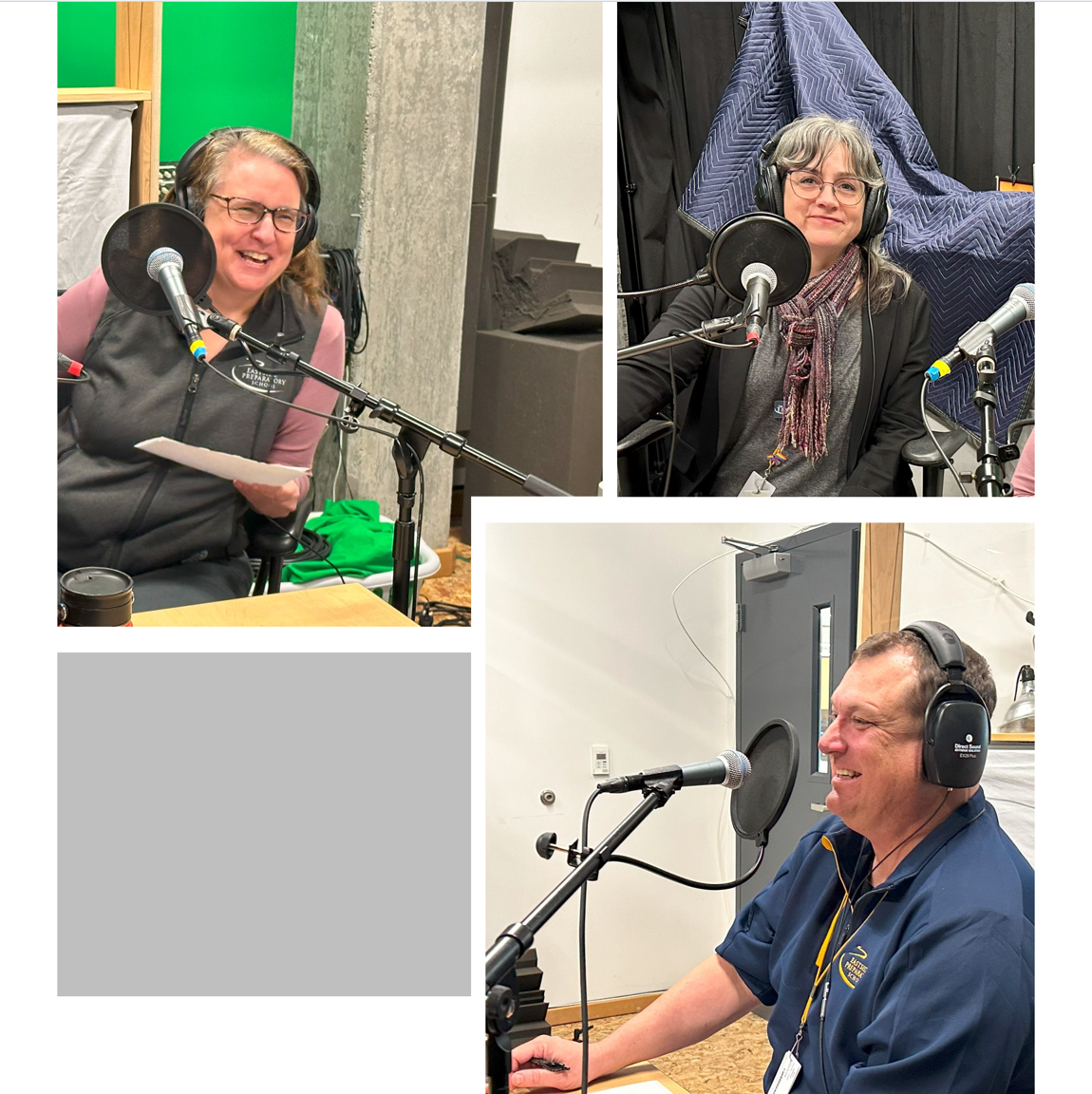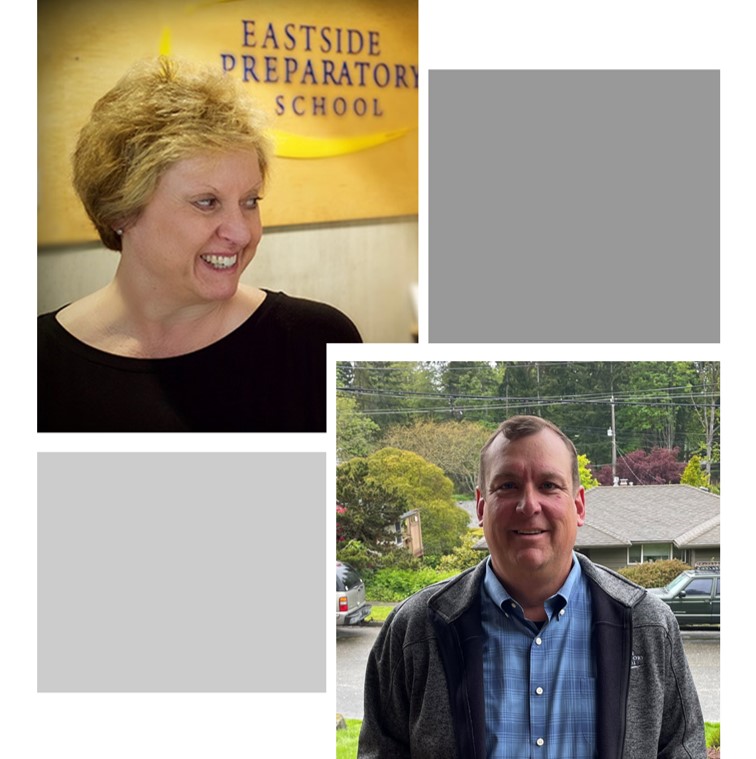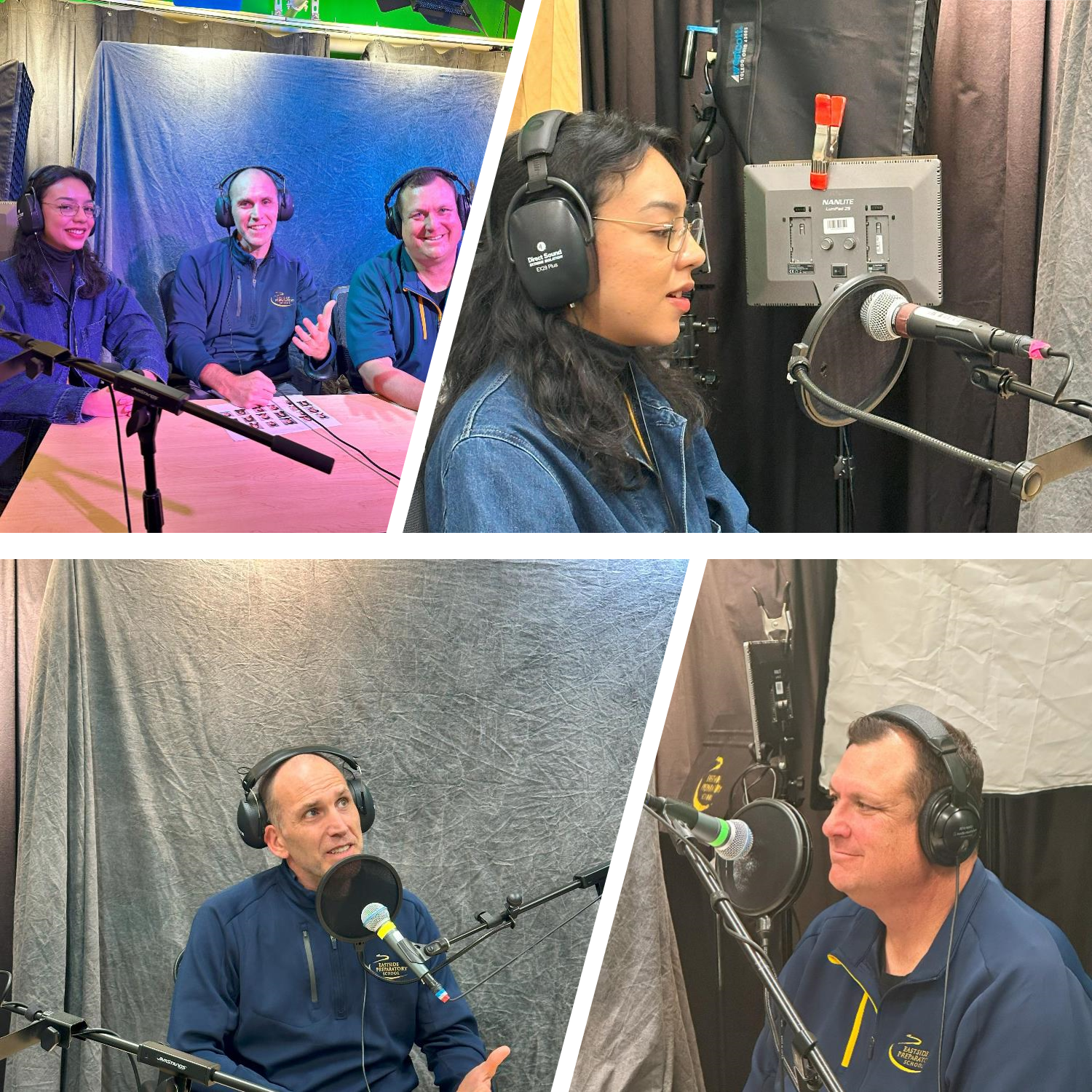Episode Transcript
[00:00:03] Speaker A: Welcome to insightful questions, the podcast that's all about getting to know Eastside Prep's new head of school, Sam Yusweck. We're diving into his vision and bringing together voices from all around eps and cool monthly chats. Get ready to dig deep into what leadership and community really mean. You're tuned into insightful questions. You.
Hi, I'm Nicole Curry. I'm Sam's wife. So I've been involved with eps for the last 15 years in that capacity. I also serve as a proofreader and editor for Inspire magazine, so I'm involved with the school in that way as well.
[00:00:43] Speaker B: Thank you for joining me, Nicole. This is our special Valentine's Day episode, and so we thought it would be a good idea to talk about partnerships since we've been partners for, let's see, 32 years or so.
[00:00:58] Speaker A: Sounds right ish.
[00:01:01] Speaker B: I can think of no one better to have this discussion with.
[00:01:04] Speaker A: Well, I'm glad to be here, Sam. And it's pretty cool to be in this recording studio because one of the first times that we had a partnership was in our college radio days in the mid 90s.
WXJM, 88.7 FM in Harrisonburg, Virginia.
[00:01:25] Speaker B: Indeed, broadcasting to approximately 17 people on any given basis. But that was where, man, that's where we spent a ton of our time in college, was at that radio station.
[00:01:38] Speaker A: Yes.
[00:01:39] Speaker B: In that sort of dingy, dingy, dingy former elementary school they converted into the communications school, right?
[00:01:47] Speaker A: Yes. It's much nicer in here. It could use some more band stickers, but otherwise very similar.
[00:01:55] Speaker B: Yeah. And so I think we were both involved in running the station. And then your senior year, you were the general manager of XJM, and I was your humble business manager, correct, if you recall?
[00:02:08] Speaker A: I recall.
[00:02:10] Speaker B: Which was really fun because it meant, I think you put a lot more fun back into the radio station. I remember the person who came before you was very marketing oriented, if you recall, and that sort of took the sort of music and the fun of exploration took a backseat to that whole thing.
[00:02:39] Speaker A: Yeah. She was much more concerned with making it, like real business, communications things. And I was like, this is supposed to be fun. It's music. We're students, right? We can do whatever we want. Kind of.
[00:02:53] Speaker B: Were you general manager when the student government association of James Madison wanted to come in and take over our programming?
[00:03:03] Speaker A: I was. We went to several student government meetings and pled our case, and I think they lost interest because we were just being a pain.
[00:03:14] Speaker B: I think they got bored.
[00:03:15] Speaker A: They were just like, do whatever you want.
[00:03:16] Speaker B: Well, our license at XGM was an educational license from the FCC, which meant that in some ways, we couldn't just play top 40. Like, that wasn't the point. That's not what our mission in terms of radio station was.
[00:03:31] Speaker A: Right. I think you might have said that at one of the meetings.
And they were like, we're students, too. We don't care.
[00:03:40] Speaker B: They wanted more Dave Matthews, who, by the way, for those Dave Matthews fans out there, when Nicole and I were on the air every Tuesday night, Dave Matthews played tracks in Charlotesville, Virginia.
And we would get tickets to give away and could not.
[00:03:57] Speaker A: No.
[00:03:58] Speaker B: For the life of us, no giving away. If you call now at five six eight, WXJM. No, five six eight dial. What was that?
[00:04:05] Speaker A: JMU dial.
[00:04:06] Speaker B: JMU dial. Well, that's clever.
[00:04:08] Speaker A: Yes.
[00:04:09] Speaker B: If you call now at JMU dial, we have two tickets to Dave Matthews at tracks. I'll take the fifth caller. I'll take the second. Just anyone?
[00:04:21] Speaker A: Nope.
[00:04:22] Speaker B: No.
[00:04:22] Speaker A: No takers.
[00:04:23] Speaker B: Now, was that because of how many people we were broadcasting to or was that because no one knew who they were back then? No one knew who Dave back then.
[00:04:30] Speaker A: Well, it was just a guy at that point. Just a guy and a guitar.
[00:04:36] Speaker B: Just a guy and a guitar.
[00:04:38] Speaker A: But, yeah, that was a very long way of saying that's our first partnership.
[00:04:48] Speaker B: Then we came out here.
[00:04:49] Speaker A: Yes, we moved to Seattle in the late ninety s. In the late ninety s. And then got married in the early 2000s. Math.
[00:05:05] Speaker B: Do you know the day we got married?
[00:05:07] Speaker A: I do.
July 20 eigth.
It's on a commemorative brick somewhere that I stop by occasionally so I can remind myself. So then that would be another partnership, husband and life.
And then we had our first daughter, Mackenzie, who was born in 2007. And that would be another partnership.
[00:05:36] Speaker B: As parents, that one has been fascinating because we each draw on our own experience as kids to inform some of the ways we want to parent and some of the ways we definitely do not want to parent. And we also draw upon what our relationships were like with our siblings.
[00:05:54] Speaker A: Yes.
[00:05:55] Speaker B: Which were very different.
[00:05:56] Speaker A: Yes. So I was the youngest of three. I was the baby.
[00:06:03] Speaker B: And you still are.
[00:06:04] Speaker A: Yes. And, yeah, just very different home lives, for sure.
[00:06:11] Speaker B: I was the elder. What did your mom call me the other day when she remembered back to. I don't know if we could even say this on a podcast.
[00:06:21] Speaker A: What did she hell on wheels.
[00:06:23] Speaker B: Yeah.
[00:06:26] Speaker A: Because my mom knows you from high school, which is a very long time ago.
[00:06:33] Speaker B: I know I was a very busy person. Very active. Very busy, busy, busy. Go, go.
[00:06:38] Speaker A: Yes, I did remind her that while you were maybe challenging to some, you had other good qualities.
[00:06:46] Speaker B: Can we list any of those right now?
[00:06:48] Speaker A: You were class president.
[00:06:49] Speaker B: That's true.
[00:06:50] Speaker A: You were an Eagle scout. See you varsity letter in many sports.
Didn't always stay in class.
[00:07:00] Speaker B: That's not true. I skipped class once, one time in my entire high school career. And do you know why I did? To hang out with you, who had a free period.
[00:07:10] Speaker A: That's true.
[00:07:11] Speaker B: When we first met.
[00:07:12] Speaker A: Right?
[00:07:12] Speaker B: We're going to edit that out later.
[00:07:14] Speaker A: Right. Alex, you are more of a can I go to my locker type person and then didn't come back.
[00:07:23] Speaker B: That's fair. Okay.
Yes.
[00:07:26] Speaker A: Anyways, do you want to talk about some partnerships at EPS?
[00:07:32] Speaker B: Yeah.
I've been lucky enough that, having been here for the time I have, we have some partnerships that span that whole time and have really gone through some significant development. The first one I can think of is our partnership with Rainier scholars. They're an organization which supports students whose families have not been involved in the independent school world attending independent schools. And they offer an incredible array of support in preparation for that. And we have seen our relationship with that group expand over time.
Our relationship deepen, and the number of scholars that we're able to support on campus grow over time. And this year, in fact, it's the first time we ever had three Rainier scholars join us in 6th grade, which is really important for a sense of creating that cohort. It's a very particular experience to be a rainier scholar within an independent school and to offer a cohort experience means there's that much more support. So that's one organization. I can think of another long term partnership which has really evolved in recent years. But we'll get to that. Is with the city of Kirkland. We've adopted Watershed park since the time I got here. Watershed park has this old gravel quarry which was used to build 405 back in the day. And actually, what people will tell you is that one of the hardest things to restore back to its natural habitat is a quarry, because it's had everything removed. And so we've been at that for a while. And our current team, led by Burton Berriger and working through some of his classes and getting our kids focused on that project, we've made significant know partnerships don't always go perfectly smoothly. There was a time when we ran a family sustainability day, a service project. We planted a whole bunch of new trees. But when you plant a whole bunch of new trees in the middle of a quarry and don't water them, they turn to sticks. Yes, it's a problem.
[00:09:55] Speaker A: That is a problem.
[00:09:56] Speaker B: But now we're working from the outside in, so it's getting better.
[00:09:59] Speaker A: So those are two long standing, very cool partnerships that EPS has been involved in. Are there new ones, new initiatives? And are you looking at those differently now that you are head of school?
[00:10:14] Speaker B: Yes. I have to look at them strategically. I have to look at partnerships in terms of how are we going to be in true partnership, how are we working together?
It's not just us getting something. It's us working with another organization or working with another school to improve our students experience, but also to help them improve.
As head of school, I get all kinds of email, hey, we want to visit, or, hey, do you want to visit? We received an email this fall from a school in Sweden who was putting together a grant proposal for their government to secure funding to come to Seattle and visit a few area schools. And we were on their list, and we said, well, why are we on your list? And they said, well, we've done our research, know we have several components of our educational philosophy that align.
We're very experiential in nature. We heard you're working hard to try new stuff, and we thought we could benefit from that. So we hopped on a phone call and got to hear about them and help them with their application. And as it turns out, they've secured that grant. They're going to come out this fall and visit, and we're going to be able to learn from them about what they're doing. And hopefully down the line, if we think three, four or five years down the line now, maybe we've set up some sort of exchange where students from there are coming here, our students are going there. But because of the magic of things like teams, we're learning together before that moment be really, that could be really exciting. And then the second one, I alluded to how our relationship with the city of Kirkland has grown. We have had wonderful partners with the city in terms of the permanent supportive housing project that's going on on our border with the former La Quinta hotel. They have been open, and they have been very excited for us to partner because they know that as one of the, well, we're a school with young kids, and we're right there on the border, and there's a lot that's going to go into this project to tackle the tragedy of the chronically unhoused. But there's a lot that needs to go into this project that needs to be thought about ahead of time that needs to be in place, and we can provide that perspective. And so it's an incredibly important partnership, and it has led to us working not only with the city, but also working with the county, who will ultimately be operating the facility.
And the. So I'm going to name drop here the deputy city manager for external affairs, Jim Lopez. In his perfect world, one day, one of our students writes the white paper on how to do permanent supportive housing. Well, and I think that's a beautiful blend of education, of service, of public policy right here in our backyard.
[00:13:22] Speaker A: That sounds great.
[00:13:23] Speaker B: Yeah.
[00:13:25] Speaker A: Are there any other things looking into the future, any glimpses or anything you can give into things you're hoping to, partnerships you're hoping to build or create over the coming years?
[00:13:40] Speaker B: For sure. I think the next step in our work when it comes to building partnerships is to systematize it. We benefit from folks who've heard of us. We hear about people, and we reach out. Sometimes through necessity, we become partners in things. But I see a time when we have a student who has an idea or has a project they want to pursue, and they need a particular expertise or they need a particular resource.
And all of that is out there in our communities. So how do we know, who do we have, who we've worked with, where we can point a student in their direction? And it's not just the student taking from that resource. It's also that resource learning for that person, maybe learning from the student about how they're thinking about the world and how they want to improve that world. And so someday down the line, three, four years, it'd be wonderful if our network of partners is very intentional and quite robust.
So I'm thinking about these partnerships. I'm thinking about my experience here at EPS, and I'm connecting it to us, and I'm thinking about how they develop over time. They go through different almost eras, if you will. They go through different challenges. They go through different realities. And that's kind of been the story of our partnership. There were sometimes we were at distance, right?
[00:15:17] Speaker A: Lived in different states.
[00:15:18] Speaker B: Lived in different states. Two or three took.
I think it speaks, too, to how partnerships have to have that trust, in that faith. I mean, is it a true fact that you moved to Seattle site unseen?
[00:15:35] Speaker A: I did, yeah. When we moved out here for you to go to grad school at UW, I just came along, which you can do when you're 22, and, yeah, it was great. But, yes, I mean, I had enough confidence in our relationship with each other. That it would work out and that you had vetted things and you had found somewhere to live and all that kind of stuff. So, yeah, there's definitely trust. Has to be a big part of any partnership, and we've had many, many eras, but you have to, because things change over time and who you are in relationships with changes over time.
In the beginning, yeah, it's just the two of us, but as time goes on, then you add family members and kids and jobs and houses and on and on. And, yeah, you can't do the same thing. And ten years into something that you did at the beginning, it's just in a totally different place.
[00:16:40] Speaker B: Yeah. The shifting priorities.
The foundation is the same, but the priorities are shifting and perhaps the focus shifts. Thank you for coming on over today.
[00:16:51] Speaker A: Yeah, thanks.
[00:16:51] Speaker B: It was fun when the kids were on this pod, they were like, you haven't asked mom yet, and they set me straight.
[00:16:59] Speaker A: Yeah, no, it was good, but I know they had a good time, so I was ready to come in and give it a shot myself.
[00:17:05] Speaker B: Well, thank you.
[00:17:06] Speaker A: Yeah, thank you.
[00:17:08] Speaker B: And happy Valentine's day.
[00:17:09] Speaker A: Oh, yeah. Happy Valentine's Day. What day is that again?
To gain more insights, check out the EPS weekly news. Each Friday.


